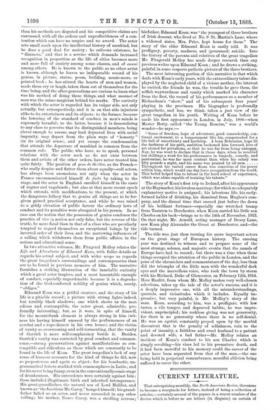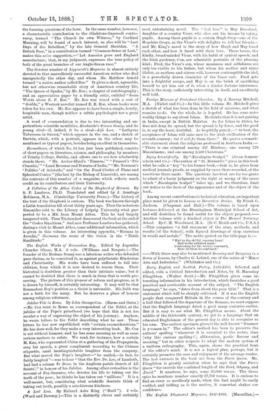CURRENT LITERATURE.
That enterprising monthly, the North American Review, threatens to become a receptacle for letters, instead of being a collection of articles,—certainly several of the papers in a recent number of the Review which is before us are letters (in disguise) on certain of
the burning questions of the hour. In the same number, however, a characteristic contribution to the Gladstone-Ingersoll contro-
versy, termed "The Church its own Witness," by Cardinal
Manning, will be found of much interest, as also will be "Last Days of the Rebellion," by the late General Sheridan. "A
British Peer," in a contribution termed "Common-Sense at Last," makes this naive suggestion,—" Let America grow and England manufacture; that, in my judgment, expresses the true policy of both of the great branches of our Anglo-Saxon race."
The October number of Lippincotes Magazine is almost entirely devoted to that marvellously successful American writer who died
unexpectedly the other day, and whom Mr. Matthew Arnold termed "a native author called Roe." It gives a short, agreeable, but not otherwise remarkable story of American country life, "The Queen of Spades," by Mr. Roe ; a chapter of autobiography ; and an appreciative paper by a friendly critic, entitled "Some Words about E. P. Roe." Mr. Roe was vexed with a sort of "double," a Western novelist named E. R. Roe, whose books were taken for his own. Mr. Roe appears to have been a simple, hearty, hospitable man, though neither a subtle psychologist nor a great artist.
A word of commendation is due to two interesting and un- pretentious scientific monthlies, Ilardwkk e's Science Gossip, and its young rival—if, indeed, it be a rival—Life Lore. " Lathyrus
Tuberosus in Sussex," which appears in the one, and a sketch of Darwin, which, with a portrait, appears in the other, may be mentioned as typical papers, besides being excellent in themselves.
Hermaihena, of which No. 14 has just been published, consists of short papers on literature, science, and philosophy, by members of Trinity College, Dublin, and allows one to see how scholarship stands there. "Mr. Archer-Hind's ` Timmus,' " " Fausset's 'Pro Cluentio,"Land Revenue and Tenures of India," "Mr. Newman's ` Politics ' of Aristotle," and "On the Focal Circles of Plane and Spherical Conies" (the last by the Bishop of Limerick), are among • the contents of this number of a magazine which reflects much credit on its contributors and their University.



















































 Previous page
Previous page